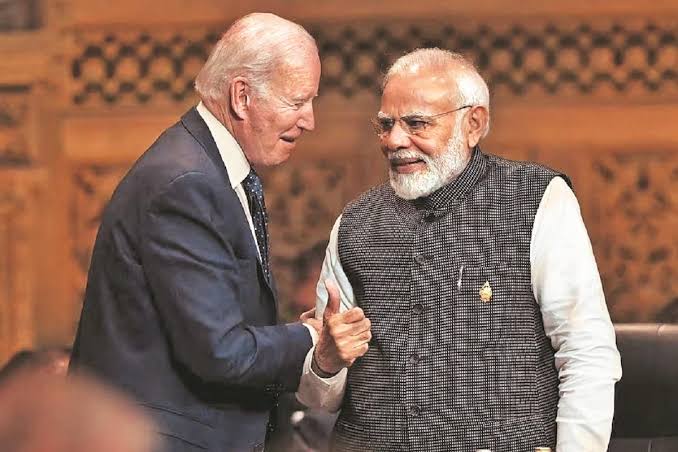The last two decades has been witness to tectonic shift in Indo-US relations. The hesistations of history has given way, and the two nations are now indispensible strategic partners. The just concluded three-day state visit to the US by PM Modi wherein he was welcomed with the highest trappings of American friendship show that the relationship between the two democracies is indeed deepening and widening.
PM Modi’s June 18-21 visit to the US has been incredibly successful for more reasons than one. The next generation partnership saw the two sides announce deliverables spanning across defence, critical and emerging technologies, climate, and the most obvious, trade. This is a new normal in Indo-US bilateral ties with technology playing the most defining role in deeepening the realtions. With technology as the centrepiece in the joint statement on defense partnership, it is now obvious that the past will no longer tarnish the future.
For quite some time India was keen on transfer of critical technologies from the US, as an add-on to major defence deals between the two nations. The MoU between General Electric and Hindustan Aeronautics Limited to produce GE F-414 jet engines in India, for HAL’s Light Combat Aircraft Mk2 was but long awaited. The world has definitely taken a note of the new Biden-Modi technology-oriented partnership and sees it as USA’s effort to wean India off its dependence on Russia. Besides enabling greater transfer of US jet engine technology, the deal worth billions have the potential to bind the American and Indian defence industries for a long time to come.
The launch of INDUS-X is further bound to facilitate joint defence technology innovation, and co-production of advanced defence technology.
The seriousness with which India, under PM Modi’s leadership, has been following up on tech-transfer, and has been engaging the US leadership is noteworthy. It’s been under his astute watch that India and US were able to finalise LEMOA (Logistics Exchange Memorandum of Agreement) in 2016, COMCASA (Communications Compatibility and Security Agreement) in 2018 and BECA (Basic Exchange and Cooperation Agreement) in 2020. The larger point here is that all these agreements which focussed on enhancing defence ties, intelligence sharing and interoperability between armed forces had been stalled for years in the past.
The iCET (Initiative on Critical and Emerging Technology) signed in January 2023, at par with the Indo-US nuclear deal, is yet another breakthrough in the Indo-US ties. The agreement encompasses important domains from India’s perspective – space, semiconductors, Artificial Intelligence and enhanced defence interoperability leading to defence co-development and co-production.
With changing contours along India’s border, PM Modi has been focussed on building deterrence capabilities. The plan to procure General Atomics MQ-9B HALE UAVs, which will be assembled in India, and enhance India’s intelligence, surveillance and reconnaissance capabilities, must be seen in this light.
At a time when the world is talking about de-coupling and de-risking, India under the leadership of PM Modi is quietly positioning itself to be the investment destination of choice. The announcement by Micron Technology, a US-based semiconductor technology and chip maker, to invest $825 million in a new chip assembly and test facility in India was a key takeaway of PM Modi’s US visit. Yet another takeaway has been that of Boeing’s decision to invest $100 million in infrastructure and pilot training.
PM Modi’s visit also sought to weed out some irritants in trade and commerce and forge a partnership that looks at the enormous potential of the two economies in entirety. The decision to resolve six unsettled disputes at the World Trade Organization has been taken with this objective in mind.
The US believes that the state visit and the deals inked point to a convergence of interests of both US and India. On one hand it can protect the autonomy of India on the other it can deepen the strategic partnership with US. This is certainly in line with India’s thinking wherein it wants the strategic partnership to help it elevate its capabilities and contribute to a stable Asia.
The state visit encompassing bilateral talks with the US President Joe Biden, an address to the joint session of the US Congress, meeting technology and business leaders, was keenly watched by leaders and diplomats around the world. Seasoned politicians and diplomats are focusing on the broader picture of the Indo-US relations and their strategic significance. The geo-political implications are being discussed in Pakistan and China, known for their hatred against India. Chinese state media is already talking about US’s wishful thinking and India’s strategic autonomy. Meanwhile Pakistan is clearly unhappy with the strong words in the joint statement on terrorism and nations harbouring terrorists.
The strategic partnership between the oldest and the largest democracies is clearly not of China’s liking, however the truth remains that China in its own way has played an important part in seeing to it that India and US forge a strong partnership. While the aim of the deals and partnership is certainly not to contain or box in China, it is not lost on anyone to see that the intent is to co-create a more stable Asia that is not vulnerable to domination by autocratic powers.
While the US President Biden and Indian Prime Minister Modi have clearly nudged US and India’s strategic partnership on a road not travelled before, it is important that the agreements inked during the state visit are translated into concrete actions. If done in right earnest, PM Modi’s state visit to the US will be etched in history as the starting of a bold new chapter in Indo-US relations.
(The views expressed are the author's own and do not necessarily reflect the position of the organisation)

